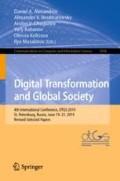Abstract
Online segregation is among the most commonly discussed phenomenon. This paper calls into question the need to focus on the dangers of echo chambers, filter bubbles; furthermore, it proposes to identify latent factors of the Internet segmentation and specify communication in homophilic communities. Thus, the current study aims to detect the mutual influence of social network choice and political behavior among Russian students. The study is based on empirical data obtained by a survey conducted in 2018 in St. Petersburg. Our research has revealed that students are a heterogeneous group. The identified four factors described as “Web-services for full-grown people,” “Mobile services,” “Closed silo of content,” “Audiovisual services” disclose hidden relationships between quite different online services and political identification of students.
Access this chapter
Tax calculation will be finalised at checkout
Purchases are for personal use only
References
Bodrunova, S., Litvinenko, A.: Fragmentation of society and media hybridisation in today’s Russia: how Facebook voices collective demands. J. Soc. Policy Stud. 14(1), 113–124 (2016)
Boutyline, A., Willer, R.: The social structure of political echo chambers: variation in ideological homophily in online networks. Polit. Psychol. 38, 551–569 (2017). https://doi.org/10.1111/pops.12337
Bruns, A.: Gatewatching and News Curation: Journalism, Social Media, and the Public Sphere. Peter Lang, New York (2018). https://doi.org/10.3726/b13293
Cattaruzza, A., Danet, D., Taillat, S., Laudrain, A.: Sovereignty in cyberspace: balkanization or democratization. In: 2016 International Conference on Cyber Conflict (CyCon U.S.), pp. 1–9. IEEE, Washington, D.C. (2016). https://doi.org/10.1109/cyconus.2016.7836628
Chugunov, A., Filatova, O., Misnikov, Y.: Citizens’ deliberation online as will-formation: the impact of media identity on policy discourse outcomes in Russia. In: Tambouris, E., et al. (eds.) ePart 2016. LNCS, vol. 9821, pp. 67–82. Springer, Cham (2016). https://doi.org/10.1007/978-3-319-45074-2_6
Conover, M.D., Ratkiewicz, J., Francisco, M., Goncalves, B., Menczer, F., Flammini, A.: Political polarization on Twitter. In: Proceedings of the Fifth International AAAI Conference on Weblogs and Social Media, pp. 89–96 (2011)
Dutton, W.H., Reisdorf, B., Dubois, E., Blank, G.: Search and politics: the uses and impacts of search in Britain, France, Germany, Italy, Poland, Spain, and the United States. Quello Center Working Paper No. 5-1-17 (2017). https://doi.org/10.2139/ssrn.2960697
Duvanova, D., Nikolaev, A., Nikolsko-Rzhevskyy, A., Semenov, A.: Violent conflict and online segregation: an analysis of social network communication across Ukraine’s regions. J. Comp. Econ. 44(1), 163–181 (2016). https://doi.org/10.1016/j.jce.2015.10.003
Gentzkow, M., Shapiro, J.M.: Ideological segregation online and offline. Q. J. Econ. 126(4), 1799–1839 (2011). https://doi.org/10.1093/qje/qjr044
Gitlin, T.: Public sphere or public sphericules? In: Liebes, T., Curran, J. (eds.) Media, Ritual and Identity, pp. 168–174. Routledge, London (1998)
Goggins, S., Petakovic, E.: Connecting theory to social technology platforms: a framework for measuring influence in context. Am. Behav. Sci. 58(10), 1376–1392 (2014). https://doi.org/10.1177/0002764214527093
Gruzd, A., Wellman, B.: Networked influence in social media: introduction to the special issue. Am. Behav. Sci. 58(10), 1251–1259 (2014). https://doi.org/10.1177/0002764214527087
Kobayashi, T., Ikeda, K.: Selective exposure in political web browsing. Inf. Commun. Soc. 12(6), 929–953 (2009). https://doi.org/10.1080/13691180802158490
Latane, B.: Dynamic social impact: the creation of culture by communication. J. Commun. 46(4), 13–25 (1996). https://doi.org/10.1111/j.1460-2466.1996.tb01501.x
Martyanov, D., Bykov, I.: Ideological segregation in the Russian cyberspace: evidences from St. Petersburg. In: Alexandrov, D.A., Boukhanovsky, A.V., Chugunov, A.V., Kabanov, Y., Koltsova, O. (eds.) DTGS 2017. CCIS, vol. 745, pp. 259–269. Springer, Cham (2017). https://doi.org/10.1007/978-3-319-69784-0_22
Newell, E., et al.: User migration in online social networks: a case study on Reddit during a period of community unrest. In: Proceedings of the Tenth International AAAI Conference on Web and Social Media (ICWSM 2016), pp. 279–288 (2016)
Nie, Y., Jia, Y., Li, S., Zhu, X., Li, A., Zhou, B.: Identifying users across social networks based on dynamic core interests. Neurocomputing 210, 107–115 (2016). https://doi.org/10.1016/j.neucom.2015.10.147
Pariser, E.: The Filter Bubble: What the Internet is Hiding from You. The Penguin Press, New York (2011)
Shu, K., Wang, S., Tang, J., Zafarani, R., Liu, H.: User identity linkage across online social networks: a review. ACM SIGKDD Explor. Newsl. 18(2), 5–17 (2017). https://doi.org/10.1145/3068777
Sunstein, C.R.: Republic.com 2.0. Princeton University Press, Princeton (2009)
Tan, S., Guan, Z., Cai, D., Qin, X., Bu, J., Chen, C.: Mapping users across networks by manifold alignment on hypergraph. In: Proceedings of the Twenty-Eighth AAAI Conference on Artificial Intelligence, pp. 159–165 (2014)
Van Alstyne, M., Brynjolfsson, E.: Global village or Cyber-Balkans? Modeling and measuring the integration of electronic communities. Manage. Sci. 51(6), 851–868 (2005). https://doi.org/10.1287/mnsc.1050.0363
Wieringa, M.A., van Geenen, D., Schäfer, M.T., Gorzeman, L.: Political topic-communities and their framing practices in the Dutch Twittersphere. Internet Policy Rev. 7(2) (2018). https://doi.org/10.14763/2018.2.793
Williams, D.: The impact of time online: social capital and Cyberbalkanization. CyberPsychol. Behav. 10(3), 398–406 (2007). https://doi.org/10.1089/cpb.2006.9939
Yun, G.W., Park, S.Y., Holody, K., Yoon, K.S., Xie, S.: Selective moderation, selective responding, and balkanization of the blogosphere: a field experiment. Media Psychol. 16(3), 295–317 (2013). https://doi.org/10.1080/15213269.2012.759462
Acknowledgments
For the empirical part, we utilized facilities provided by the Center for Sociological and Internet Research at Saint-Petersburg State University (project 106-9131 “The factors of absenteeism development among students in a Russian metropolis (as in the example of St. Petersburg)”). The theoretical part of the reported study was funded by RFBR and EISR according to the research project № 19-011-31551 “Manageability and discourse of virtual communities in the context of post-factual politics”.
Author information
Authors and Affiliations
Corresponding author
Editor information
Editors and Affiliations
Rights and permissions
Copyright information
© 2019 Springer Nature Switzerland AG
About this paper
Cite this paper
Martyanov, D., Lukyanova, G., Lagutin, O. (2019). Is Cross-Network Segregation a Factor of Political Behavior and Political Identification in the Russian Student Community?. In: Alexandrov, D., Boukhanovsky, A., Chugunov, A., Kabanov, Y., Koltsova, O., Musabirov, I. (eds) Digital Transformation and Global Society. DTGS 2019. Communications in Computer and Information Science, vol 1038. Springer, Cham. https://doi.org/10.1007/978-3-030-37858-5_13
Download citation
DOI: https://doi.org/10.1007/978-3-030-37858-5_13
Published:
Publisher Name: Springer, Cham
Print ISBN: 978-3-030-37857-8
Online ISBN: 978-3-030-37858-5
eBook Packages: Computer ScienceComputer Science (R0)

